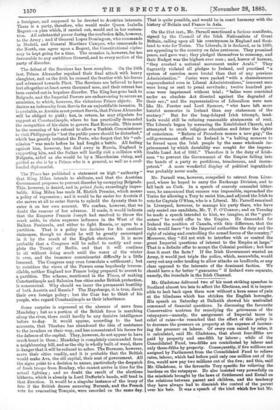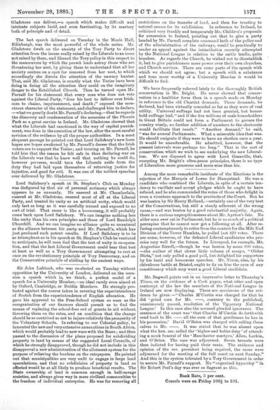Mr. Gladstone delivered two of his most striking speeches in
Scotland almost too late to affect the Elections, and it is impos- sible to look back upon them now without a keen sense of pain at the blindness which has stricken the English boroughs. His speech on Saturday at Dalkeith showed his unrivalled command of financial questions. In discussing the favourite Conservative nostrum for remedying the grievances of the ratepayers—namely, the assignment of Imperial taxes in relief of rates—he remarked that the effect of this policy is to decrease the pressure on property at the expense of increas- ing the pressure on labour. Of every sum raised by rates, it is calculated, said Mr. Gladstone, that about four-fifths are paid by property and one-fifth by labour ; while of the Consolidated Fund, two-fifths are contributed by labour and only three-fifths by property. Consequently, if five millions are assigned by Parliament from the Consolidated Fund to relieve rates, labour, which had before paid only one million out of the five, would now pay two millions out of the five ; and this, said Mr. Gladstone, is the favourite Tory specific for relieving the burdens on the ratepayer. He also insisted very powerfully on the mischiefs brought by the laws of Settlement and Entail on the relations between parent and children, and the tendency they have always had to diminish the control of the parent over his heir. It was a speech of the kind which few but Mr. Gladstone can deliver,—a speech which makes difficult and intricate subjects lucid, and even fascinating, by its mastery both of principle and of detail.



































 Previous page
Previous page